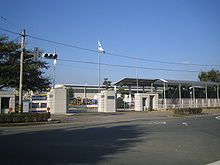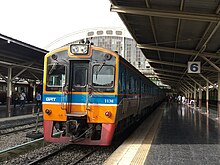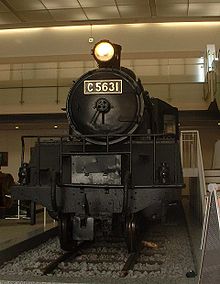| This article possibly contains original research. Please improve it by verifying the claims made and adding inline citations. Statements consisting only of original research should be removed. (April 2023) (Learn how and when to remove this message) |
| [REDACTED] | |
 Nippon Sharyo's headquarters Nippon Sharyo's headquarters | |
| Native name | 日本車輌製造株式会社 |
|---|---|
| Romanized name | Nippon Sharyō Seizō kabushiki gaisha |
| Formerly | Nippon Sharyo Seizo Kaisha, Ltd. |
| Company type | Public KK |
| Traded as | TYO: 7102 NAG: 7102 |
| Industry | Railways |
| Founded | September 1896; 128 years ago (1896-09) Japan |
| Headquarters | Nagoya, Japan |
| Key people | Tsutomu Morimura (President & CEO), Mikio Tsuge (Senior Managing Director of Nippon Sharyo, Ltd and Chairman of Nippon Sharyo USA, Inc.) |
| Products | Rolling stock |
| Revenue | 101,094,000,000 yen (2017) |
| Operating income | −5,104,000,000 yen (2017) |
| Net income | −5,114,000,000 yen (2017) |
| Total assets | 129,194,000,000 yen (2017) |
| Number of employees | 1,850 (September 2018) |
| Parent | JR Central (50.1%) |
| Website | www |














Nippon Sharyo, Ltd. (日本車輌製造株式会社, Nippon Sharyō Seizō kabushiki gaisha, literally "Japan Rolling Stock Manufacture Company" and formerly known outside Japan as Nippon Sharyo Seizo Kaisha, Ltd.), formed in 1896, is a major rolling stock manufacturer based in Nagoya, Japan. In 1996, it abbreviated its name to "日本車両" Nippon Sharyō. Its shortest abbreviation is Nissha "日車". It was a listed company on Nikkei 225 until 2004. It is listed on the Tokyo Stock Exchange and Nagoya Stock Exchange as ticker 7102. In 2008, Central Japan Railway Company (JR Central) became the majority shareholder (50.1%) of the financially struggling Nippon Sharyo making the firm a "consolidated subsidiary" of JR Central. In July 2012 Nippon Sharyo USA started production in their new facility in Rochelle, Illinois. The facility closed at the end of October 2018 due to a lack of orders.
Notable projects
 Japan
Japan
- Shinkansen ("bullet train") trainsets
- Odakyu Electric Railway trainsets
- Linimo maglev train
- Keisei Electric Railway trainsets
- Nearly all Meitetsu trains
 Argentina
Argentina
- Roca Line
- Buenos Aires Underground
- Nagoya 250/300/1200 series (Retired in 2019)
- Nagoya 5000 series
 Brazil
Brazil
 Canada
Canada
- Toronto Transit Commission work cars
- RT10 Garbage car 1967 – Tokyo Rose retired in 2000 and scrapped
- RT12 Electric locomotive 1968 (design similar to JNR Class DE locomotive), retired 2009 and scrapped
- RT13 Centre cab crane 1968 – with car and crane cabs
- RT22 Flat car 1973 – formerly wash car RT-17 and rebuilt 1996
- RT54 flat car 1973
- Union Pearson Express Diesel Multiple Units
- Nippon Sharyo DMU (jointly with Sumitomo Corporation) 2014
 Philippines
Philippines
- Manila Light Rail Transit System Line 1 (jointly with Kinki Sharyo)
 Singapore
Singapore
 Republic of China
Republic of China
 United States
United States
- Next Generation Bi-Level Passenger Rail Car
- Los Angeles County Metro Rail P865 and P2020
- Northern Indiana South Shore Line EMUs
- Maryland MARC Train single-level push-pull coaches (jointly with Sumitomo Corporation)
- Bi-level gallery cars for Chicago Metra, Virginia VRE, and San Francisco Bay Area Caltrain
- Highliner bi-level EMUs for Metra and South Shore Line
- Sonoma–Marin Area Rail Transit Nippon Sharyo DMU (jointly with Sumitomo Corporation)
 Venezuela
Venezuela
I.F.E EMUs Working on Caracas-Cua commuter line Railway System Ezequiel Zamora (Central)
 Indonesia
Indonesia
Rheostatic series (KRL Rheostatik Mild Steel and Stainless) (The train was also made by Kawasaki Heavy Industries and Hitachi):
- Built 1976: Has 2 doors and uses mild steel body types
- Built 1978,1983,1984: Has 3 doors and uses mild steel body types
- Built 1986,1987: Has 3 doors and uses stainless steel body types
All Rheostatic EMUs have stopped operating in the Jabodetabek lines and is currently waiting to be scrapped.
Shinko Diesel Multiple Units (a.k.a. KRD MCW 301 and KRD MCW 302) are used for short-distance lines such as Surabaya-Lamongan, Surabaya-Sidoarjo, etc.
- KRD MCW 301 Built 1976: Has 2 doors and uses mild steel body types
- KRD MCW 302 Built 1978,1980,1982,1987: Has 3 doors and uses mild steel body types
KRD MCW 301 and 302 initially uses the Shinko DMH17H engine and Niigata TCR 2.5 transmission
Note: The DMUs built in 1976 are now used as regular loco-hauled trains without engines. The DMUs made in 1978, 1980, & 1982 upwards are refurbished with a Cummins Engine (NT885-R) and Voith turbo (T211re.3) transmission.
The new rolling stock, known as the MRTJ 1000, was built specifically for the Jakarta MRT
 Thailand
Thailand
- State Railway of Thailand
- SL
- C56 (Numbers 715-716 and 723-729 or formerly owned by Japanese Government Railways, numbers 17-18 ,28 ,30-32 ,34 and 36-37 In 1979, Japan asked to buy back the steam locomotive C56, number 725, original C56 31, back to its homeland of Japan. It is on display at the Yūshūkan Museum. But there are traces of having been used in Thailand. The driver's cab has the number 725 and the transport vehicle has Thai letters (ร.ฟ.ท.) SRT.)
- DX50 (Numbers 351-352 and 363-364)
- CX50 (Numbers 288-292 ,821-834 ,837-841 and 850)
- DMU
- SL
 Jordan
Jordan
Nippon Sharyo Seso Kraisha Co., Ltd. originally built 5 CX50 Steam locomotives in 1953 and was ready to sell them to the State Railway of Thailand using numbers 851 - 855 as reserve vehicles. But the railway did not accept the locomotive, so it was sold to Hejaz railway in Jordan in 1959
- CX50 (Numbers 81-85)
Wartime involvement

Nippon Sharyo, in 1936, built the JNR Class C56 steam locomotive number C56 31, which was used in 1943 to open the infamous Thai-Burma Railway, as stylized in the movie The Bridge Over the River Kwai, built by over 100,000 Allied POW and other slave labourers. This restored steam engine now sits in the foyer of the Yasukuni War Museum in Tokyo. Japanese veteran groups raised funds to return the locomotive from Thailand to Japan in 1979.
During World War II, Nippon Sharyo, like many major Japanese companies, drew upon prisoner of war labour to maintain war production. The POW camp at Narumi provided Allied POW forced labour for Nippon Sharyo.
References
- "Home". International Railway Journal.
- ^ "JR Central takes majority stake in train builder". Railway Gazette International. 1 October 2008.
- "Retirarán de servicio todos los trenes Nagoya". June 27, 2018.
- "Finalmente serán 30 coches los nuevos Nagoya para la línea C". December 18, 2013.
- "Subway Car for Singapore Mass Rapid Transit Corporation(MRT)". Archived from the original on 2012-07-16. Retrieved 2012-03-11.
- "Taiwan Railway Administration orders tilting trains". Railway Gazette International. 6 January 2011.
- ^ "Sonoma-Marin orders commuter DMU cars". Railway Gazette International. 20 December 2010.
- "Nippon Sharyo, Produsen Shinkasen Sekaligus Kereta MRT Jakarta - Industri - Bisnis.com". Bisnis.com (in Indonesian). 2019-08-20. Archived from the original on 2019-08-20. Retrieved 2021-08-08.
- "Steam Locomotives in Jordan, 2015". www.internationalsteam.co.uk.
- Narumi POW Camp Retrieved 27 June 2010.
External links
Categories:- Locomotive manufacturers of Japan
- Rolling stock manufacturers of Japan
- Tram manufacturers
- Japanese brands
- Manufacturing companies based in Nagoya
- Companies listed on the Tokyo Stock Exchange
- Companies listed on the Nagoya Stock Exchange
- Japanese companies established in 1896
- Vehicle manufacturing companies established in 1896
- Electric vehicle manufacturers of Japan
- Rail infrastructure manufacturers